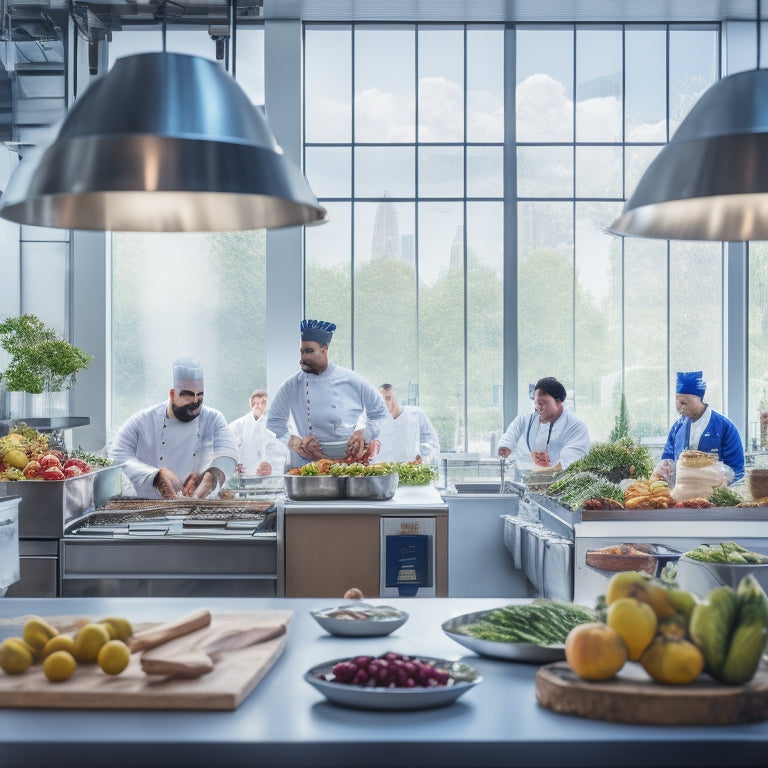
Ultimate Guides for Food Service Business Success
Share
You're about to reveal the secrets to a thriving food service business. Start by building a solid foundation: invest in the right equipment, maintain it to prevent breakdowns, and train staff for efficiency. Next, optimize daily operations by simplifying your menu, implementing flexible scheduling, and adopting just-in-time inventory. Finally, embrace innovation and sustainability by incorporating eco-friendly practices, investing in energy-efficient equipment, and reducing waste. By masterfully balancing these elements, you'll set your business up for long-term success. As you take the next step, you'll discover even more strategies to propel your food service business to new heights.
Key Takeaways
• Invest in the right equipment, supplies, and layout to ensure efficient operations and customer satisfaction.
• Simplify menu and inventory management to reduce waste, improve workflow, and increase profitability.
• Implement sustainable practices, such as composting and recycling, to appeal to eco-conscious customers and reduce environmental impact.
• Conduct regular staff training and maintenance to prevent equipment breakdowns and ensure safe operations.
• Adopt innovative technologies, such as energy-efficient equipment and automated systems, to reduce costs and stay competitive.
Building a Strong Foundation
When launching a food service business, you must prioritize building a strong foundation by investing in the right equipment, supplies, and layout to guarantee efficient operations, customer satisfaction, and ultimately, success.
You'll need to take into account equipment maintenance, making sure that your machinery is regularly serviced to prevent breakdowns and prolong its lifespan.
Additionally, staff training is important to ensure that your team can operate equipment safely and efficiently.
A well-managed supply chain and inventory management system will also help you streamline operations and reduce waste.
Optimizing Daily Operations
With a solid foundation in place, you can now focus on optimizing daily operations, starting with streamlining your menu, scheduling, and workflow to maximize efficiency and profitability. By improving efficiency, you'll reduce waste and increase productivity. Here are some key areas to focus on:
| Area | Strategies | Benefits |
|---|---|---|
| Menu Engineering | Simplify menu, reduce SKUs | Reduce inventory costs, improve kitchen workflow |
| Scheduling | Implement flexible scheduling, cross-train staff | Improve labor efficiency, reduce overtime |
| Inventory Management | Implement just-in-time inventory, reduce stock levels | Reduce waste, improve cash flow |
| Supply Chain | Negotiate with suppliers, reduce packaging waste | Reduce costs, improve sustainability |
| Cleaning and Sanitation | Implement efficient cleaning schedules, reduce chemical usage | Improve cleanliness, reduce waste and costs |
Embracing Innovation and Sustainability
Take your food service business to the next level by incorporating innovative and sustainable practices that not only benefit the environment but also improve your bottom line. By adopting sustainability practices, you'll reduce waste, conserve resources, and appeal to the growing number of eco-conscious customers.
Invest in innovative technology, such as energy-efficient equipment and automated systems, to streamline operations and reduce costs. Consider implementing composting programs, recycling initiatives, and sustainable supply chains to minimize your environmental footprint.
Frequently Asked Questions
How Often Should I Deep Clean My Commercial Kitchen Equipment?
You should deep clean your commercial kitchen equipment regularly, ideally every 1-3 months, to maintain sanitary conditions and extend its lifespan; create a cleaning schedule to guarantee consistent equipment maintenance and prevent breakdowns.
What Are the Benefits of Using Eco-Friendly Food Packaging Materials?
"Listen, you're not just saving the planet with eco-friendly food packaging, you're saving your business too. Sustainable practices bring cost savings, while boosting your brand image and customer satisfaction - it's a win-win, and a no-brainer."
Can I Customize the Layout of My Commercial Kitchen to Fit My Needs?
You can create a highly efficient kitchen by customizing the layout to fit your specific needs, optimizing space with a functional design that streamlines workflow, and boosting kitchen efficiency through strategic placement of equipment and stations.
How Do I Properly Sanitize My Food Service Equipment and Utensils?
You maintain proper cleaning and sanitizing of your food service equipment and utensils by implementing effective techniques, maintaining equipment regularly, and adhering to strict hygiene standards to prevent contamination and foodborne illness.
Are There Any Regulations I Need to Follow for Food Waste Disposal?
You must comply with local waste management regulations, ensuring proper food waste disposal and implementing recycling practices to reduce environmental impact, which may include separating organic waste, using compostable containers, and tracking waste metrics.
Related Posts
-

Mastering Kitchen Organization: 7 Expert Tips Inside
You're just a few simple strategies away from transforming your kitchen into a highly functional and efficient space ...
